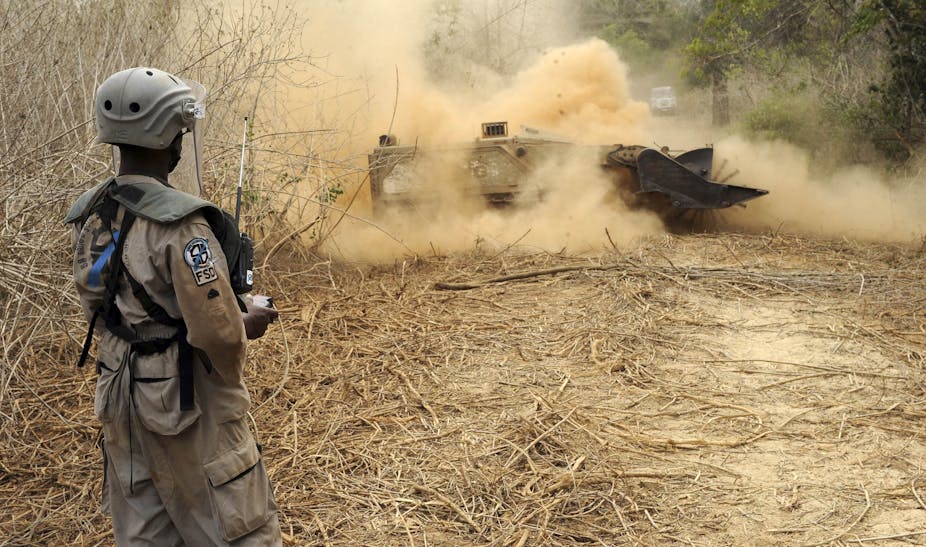CHOGM: Sri Lankan President Mahinda Rajapaksa is among the Commonwealth leaders gathering in Perth this week. But his government is accused of committing war crimes against its own people. Ben Saul, Professor of International Law at the University of Sydney, looks at what action should be taken against his administration.
The Commonwealth Heads of Government Meeting (CHOGM) in Perth, will welcome officials from a particularly cruel and self-righteous Commonwealth government, Sri Lanka.
A claim that its President, Mahinda Rajapaksa, should be indicted for war crimes, is being investigated by federal police. Prime Minister Julia Gillard says no action could be taken without the consent of the government, but Australia will continue to put pressure on Sri Lanka to address allegations of serious human rights abuses.
Brutality
The evidence suggests that tens of thousands of civilians were massacred by the Sri Lankan military during the dying months of the civil war in 2009.
There has been no reckoning for the perpetrators. The traumatised survivors live without justice and often in fear. Quite a few now live in Australia as refugees.
The Sri Lankan Government insists that the end of the war involved “humanitarian rescue operations” and “zero civilian casualties”, in the face of a ruthless terrorist enemy, the Tamil Tigers.
The Tamil Tigers’ brutality is no secret. They used human shields, misused hospitals for military purposes, and slaughtered civilians fleeing to safety.
They forcibly recruited children as young as 14 years old, and mastered the dark art of suicide bombing.
But Sri Lanka’s war on terror ultimately became just as insidious. A government of butchers unleashed an extreme military which knew no law or humanitarian limits.
Evidence of war crimes

An expert investigation by the United Nations in 2010 found credible evidence of serious war crimes by Sri Lanka. Sri Lanka deliberately fired on the civilian “safety” zones where hundreds of thousands of civilians were clustered, and targeted UN facilities, hospitals, food distribution lines, and even ships rescuing the wounded.
There is evidence of summary executions, denial of quarter, torture, enforced disappearances, and rape.
The UN reports that Sri Lanka has not conducted any real criminal investigations, provided remedies to victims, or pursued meaningful reconciliation.
There are still many Tamils detained virtually incommunicado. Sri Lanka’s response has been to incredulously deny everything, or to blame the Tamil Tigers.
The global war on terror after 9/11 legitimised its approach, and few countries have seriously protested.
Australian action
Australia has a political and moral interest in this issue because it believes human rights are important, and that war criminals should face justice.
It also has a legal interest because it is a party to many treaties, such as the Geneva Conventions and the Rome Statute of the International Criminal Court, which demand action.
In the first place, it should refuse entry visas to any Sri Lankan official suspected of war crimes, however senior.
There is ample scope to do so under the Migration Act, utilizing the Minister for Immigration’s “bad character” power.
The Minister for Foreign Affairs can also certify that a person’s entry would not be in Australia’s foreign policy interests, which surely includes hosting war criminals for tea in Perth.
Criminal investigation

Next Australia should launch a genuine criminal investigation into allegations of war crimes or crimes against humanity.
Many victims live in the Australian community. Acute violence committed against people now living in the Australian community deserves redress.
Some witnesses to atrocities have given statements to the International Commission of Jurists here, which has passed on evidence to the federal police.
Regrettably, Australia has no specialised war crimes investigation unit. It needs one, and proper funding for it, urgently.
Where criminal investigations turn up suspects, if they are in Australia they should be prosecuted.
Australia has extended universal jurisdiction over war crimes even in civil wars since 2002. That includes responsibility for political and military commanders who failed to stop crimes occurring.
If any suspects are diplomats, their diplomatic immunity must be revoked. If they live abroad, Australia should pursue their extradition wherever possible.
Australia could also offer technical assistance to Sri Lanka in establishing its own war crimes investigations and prosecutions, such as through a special tribunal.
International solutions
Australia also has other options internationally. It can exert pressure through the UN Human Rights Council, now considering the UN expert report, for Sri Lanka to be collectively condemned.
While Australia remains a candidate for the UN Security Council, it could ask the Council to refer Sri Lanka for investigation by the International Criminal Court, just as we supported referring Gaddafi’s Libya.
Australia could also call for sanctions to be imposed on a government, and its leaders, which continue to get away with murder.
Commonwealth ban
One step Australia could take this week is to seek the suspension of Sri Lanka from the Commonwealth, just as Prime Minister Howard courageously sought action against Mugabe’s Zimbabwe. Already, Canada’s President Stephen Harper has threatened to boycott the 2013 Commonwealth meeting in Sri Lanka until there is justice.
Australia must have the courage of its convictions. Mass violence that goes unpunished strikes at all of us. Australia has a responsibility to shine a light onto the evil done in faraway jungles, where the dead are unable to speak for themselves.
Read more:
Our complex relationship with India
That sinking feeling: will the Pacific be heard at CHOGM 2011?
Can CHOGM take the reins in the face of NCD disaster?
A long line of discrimination but should succession to the throne be changed?

